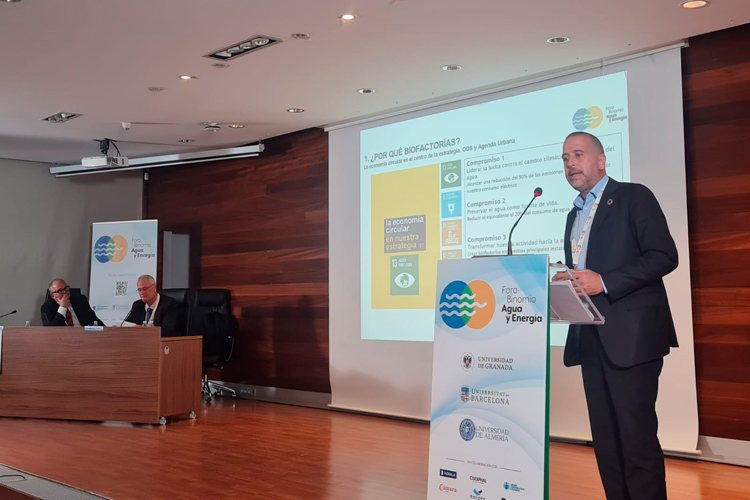Hidralia exposes the importance of the transition to 'Ecofactory' at the Water and Energy Binomial Forum held in Almería
The company is working to implement this model in its different concessions and highlights the step that is being taken in Roquetas for the use of reclaimed water
Hidralia, an Andalusian environmental company for the management of the integral water cycle, is aware of the importance of finding new formulas to face the new challenges of the most basic resources of the planet, water and energy, due to the increase in demand and depletion of the sources. That is why it sponsors the First Water and Energy Binomial Forum that takes place in the Archaeological Museum of Almería and is organized by the universities of Granada, Barcelona and Almería.

An initiative with which it is intended to analyze some keys to the synergies between both subjects, offer a perspective on its regulation and show initiatives that allow progress towards sustainability.
A space that has been used by Hidralia to expose the importance of one of its great commitments: the change in the model of the Water Treatment Stations (EDARs) to the so-called 'Ecofactories'.
In a presentation given by Ernesto Sánchez, Hidralia's director of Innovation and member of the Cetaqua (Water Technology Center) board of trustees, and Jorge Palomino, the company's Legal Director, explained how until now the function of these treatment plants was the to collect wastewater from a town to, through a series of processes, return it to the environment in the best possible conditions. However, Hidralia has changed its philosophy to consider these facilities as a 'factory' of resources that regenerates water for new uses (irrigation, agricultural and industrial), which values all waste (for example, biogas generation from of the sludge resulting from the purification), and, finally, it produces energy for its own supply, generating a positive impact on its environment.
This is what the company calls the 'Ecofactory' and in this way an analysis of the methodology for transforming a facility to this new way of understanding the water purification process was carried out, which has become one of the greatest exponents of the circular economy.
Going through its legal approach, stopping at the regulations, guidelines, different reports, regulations for water purification and the defense of water ecosystems (such as the new objectives set through the European Green Pact and the UN Sustainable Development Goals ), as well as examples of successful experience.
Among them, the one known as Bio Sur de Granada Ecofactory stands out, which is already consecrated and has several recognitions regarding its management, whose model serves as a guide to extrapolate the experience to other territories. This is the case of the Roquetas treatment plant, managed by Hidralia, and which has taken a very significant step towards this new paradigm with the tertiary works.
An action that will allow the facility to have the necessary facilities to offer a quality effluent (treated wastewater) so that 100% of the water regenerated in the plant can be used to irrigate greenhouses. This makes the action a driving lever not only for the circular economy, but also for minimizing the impact of periods of drought by avoiding having to extract this resource from the aquifer and/or the desalination plant. In fact, it will ensure that the 8.3 hm3, which on average are now treated, can be used 100% (up to a maximum of 11.3 hm3) for agricultural use.
